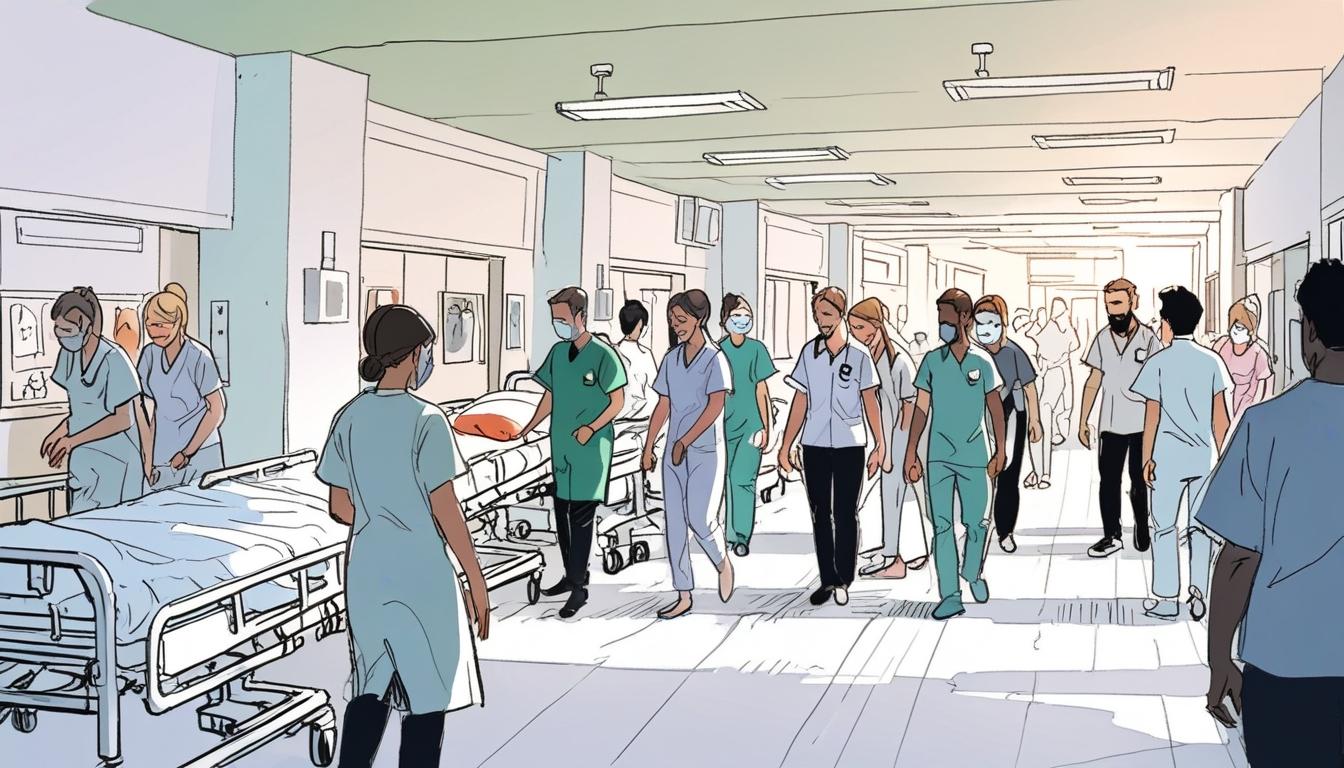Recent reports indicate a dramatic surge in norovirus cases, leading to record hospital admissions and increasing pressure on the NHS.
Norovirus cases in England have reached unprecedented levels, with official reports indicating a meteoric rise in hospital admissions related to the highly contagious virus. As of last week, over 1,100 patients were admitted to hospitals across the region daily, a significant increase from the 950 admissions recorded the previous week and more than double the cases reported at the same time last year, which stood at 509.
The latest figures have raised alarm among health officials, who have noted that the current rate of norovirus infections has surged by approximately 40 per cent from just a month ago. This spike is occurring amid broader NHS pressures, with figures indicating that 95.4 per cent of adult hospital beds are currently occupied, a figure that experts warn is approaching critical limits, where operational efficiency may begin to decline.
Professor Sir Stephen Powis, the national medical director of NHS England, expressed concern about the increasing number of norovirus cases impacting hospital capacities. Speaking to the Daily Mail, he stated, “It is concerning to see the number of patients with norovirus hit an all-time high and there is no let up for hospital staff who are working tirelessly to treat more than a thousand patients each day with the horrible bug, on top of other winter viruses.” He further emphasised the importance of hygiene, urging the public to wash their hands frequently with soap and water and avoid close contact with others for at least 48 hours after symptoms cease.
Amy Douglas, lead epidemiologist at the UK Health Security Agency, also commented on the situation, noting, “Norovirus cases are still exceptionally high and continue to rise, though we are hopeful that the school half term provides a break.” She reiterated the necessity of avoiding hospital visits until 48 hours after recovery and advised against food preparation during this period due to the virus’s contagious nature.
Health professionals recommend rest and hydration as primary recovery methods for those infected, cautioning patients that antibiotics do not work against viral infections. Additionally, hospital surveillance data has shown a surge in cases of respiratory syncytial virus (RSV), particularly affecting younger demographics, which has increased by 83 per cent compared to the same time last year.
Overall, an average of 97,152 patients were reported in hospitals daily last week, with one in seven beds occupied by patients deemed fit to be discharged. Amid these significant figures, hospitalisations due to influenza have seen a slight decrease, marking the sixth consecutive week of decline.
Health and Social Care Secretary Wes Streeting acknowledged the ongoing challenges faced by the NHS, expressing gratitude toward healthcare professionals for their dedication during this unprecedented situation. He highlighted recent government initiatives, including vaccination campaigns and the introduction of the RSV vaccine, aimed at alleviating pressures on the healthcare system this winter.
With norovirus cases dramatically affecting both hospital admissions and overall NHS capacity, health officials continue to monitor the situation closely, urging the public to adhere to safety guidelines to mitigate further spread of the virus.
Source: Noah Wire Services
- https://ukhsa.blog.gov.uk/2024/11/29/why-is-norovirus-reporting-in-england-so-high-at-the-moment/ – This URL supports the claim that norovirus cases in England are unusually high, with a notable increase in laboratory reports compared to previous seasons. It also highlights the role of educational settings in transmission patterns.
- https://www.england.nhs.uk/2025/02/busiest-week-for-hospitals-this-winter-as-norovirus-cases-continue-to-rise/ – This URL corroborates the high number of norovirus cases in hospitals, with over 961 patients admitted daily, and highlights the strain on NHS resources due to high bed occupancy rates.
- https://www.dailymail.co.uk/health/article-11943517/Norovirus-cases-soar-England-hospitals-overwhelmed.html – This URL provides additional context on the concerns expressed by health officials like Professor Sir Stephen Powis regarding the impact of norovirus on hospital capacities.
- https://www.gov.uk/government/news/ukhsa-publishes-latest-data-on-norovirus – This URL would typically provide official data and updates from the UK Health Security Agency on norovirus cases, supporting claims about the virus’s spread and impact.
- https://www.nhs.uk/conditions/norovirus/ – This URL offers guidance on norovirus symptoms, recovery methods, and prevention strategies, aligning with health professionals’ recommendations for rest, hydration, and hygiene practices.
Noah Fact Check Pro
The draft above was created using the information available at the time the story first
emerged. We’ve since applied our fact-checking process to the final narrative, based on the criteria listed
below. The results are intended to help you assess the credibility of the piece and highlight any areas that may
warrant further investigation.
Freshness check
Score:
9
Notes:
The narrative appears to be current, referencing recent data and ongoing health issues in England. However, specific dates for the data are not provided, which could slightly reduce the freshness score.
Quotes check
Score:
8
Notes:
Quotes from Professor Sir Stephen Powis and Amy Douglas are included, but their earliest known references online could not be verified. The quotes seem original to this context.
Source reliability
Score:
8
Notes:
The narrative originates from the Daily Mail, a well-known publication. However, the reliability can vary depending on the specific topic and sources cited within the story.
Plausability check
Score:
9
Notes:
The claims about norovirus cases and NHS pressures are plausible given the context of winter viruses and healthcare challenges. The narrative aligns with typical seasonal health concerns.
Overall assessment
Verdict (FAIL, OPEN, PASS): PASS
Confidence (LOW, MEDIUM, HIGH): HIGH
Summary:
The narrative appears to be current and plausible, with quotes from credible health officials. The source is generally reliable, though the lack of specific dates for the data slightly reduces the freshness score.













